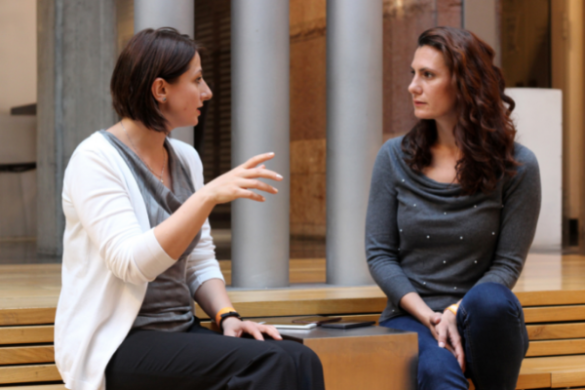Listening is a priceless skill. It is through listening that we learn, find clarity and connect with others. When we are listened to, we feel valued, and in listening to others we make them feel valued too. Very little time, however, is spent on teaching people how to listen. At first, it may seem like an innate skill that shouldn’t need to be taught, but this is far from true.
Hearing is automatic but deep listening is a learned skill, which improves with attention and practice. Being empathetic, non-judgmental and quiet is a great starting point for good listening.
If you could use more help learning to listen effectively to your kids (or anyone else in your life), begin by following these tips below on how to become a better listener.
Eliminate distractions
Now we know that this is MUCH easier said than done. If you’re trying to talk to another parent, you can’t simply eliminate the child standing beside you saying “Mum..mum…mum…MUM..MUM” until they’re blue in the face, nor can you eliminate a baby who’s fussing about while breastfeeding, but there are distractions that you can eliminate.
If you know you are sitting down to have a conversation with somebody, then try not to have your phone out. If a conversation begins at a time when you are already using your phone, (eg. because your child walks into the room and just starts talking) then make a conscious effort to put your phone face down or away in your bag or pocket until you are finished speaking with them. If you need to finish sending a message or email when they interrupt you, then just say “Please wait for a minute until I’ve finished XXXXX and then you’ll have my full attention.”
Prioritise the people in front of you
By the same token, if your phone rings while you are mid-conversation with someone, don’t answer it unless it’s likely to be important. People make calls when it is convenient for them, but unless it is convenient for you, you’re not obliged to answer. Don’t fall victim to the trap of being “always available”, especially if it comes at the expense of the quality of time you share with the people who are literally in front of you. It is often the case that if you are always available, you are never fully present.
Make mental space
It’s important to know that no meaningful conversation can occur if you are beginning it with a mind that is preoccupied, full and focused on other things. The reason for this is that people physically cannot speak as fast as we are able to think. “On average, people speak at around 125 words per minute, but we have the capability to comprehend up to 400 words per minute” and this gap causes our brains to lose focus and wander back to our own problems and to-do lists.
Before entering any new conversation, attempt to clear your mind and make mental space for what the speaker has to say. To do this, jot down tasks you need to resume post-conversation, so your brain is not tasked with remembering them, and take a few deep breaths. It may also help you to move into a different location. Eg. If you’re working from home, move away from your home office/laptop so your focus won’t be drawn back to work-related matters.
Often though, conversations (especially with children) happen without warning- when you’re in the middle of something like cooking dinner or getting ready to leave the house. There will be times like this when you can’t drop everything and listen (at least not without ruining the dinner or running late). In these moments, let your child/partner/friend know that (unless it is an emergency) you can’t give them your full attention right away but you’ll make time to have a more meaningful conversation with them as soon as you’re done with X task, or ASAP.
Pay attention
It sounds obvious, right? But how many times have you found yourself in a conversation where a story someone told brought an anecdote of your own to mind and then rather than giving your attention to the point of their story, you became eager for them to finish, so you could share your own. This is not listening, this is waiting for your turn to speak, and it happens all the time as a result of the aforementioned gap in speaking and comprehension speeds. When you’re waiting for your turn to speak, you’re no longer listening properly. So what can you do? The short answer is to practise. Each time you have an impulse to share a personal anecdote let.it.go.
We’re often compelled to match anecdotes because we feel like sharing our similarities brings us closer to the speaker. This, however, is more often perceived by the other party as a shift from them to you. You’ll create a stronger bond with the speaker by setting your story to the side so that you can listen more closely to theirs.
Should their story end with a question like “Have you ever experienced anything like this?”, “What would you do in this situation?” or “What should I do?” then, by all means, share an anecdote highlighting where your solution might be one they could adopt. There’s every chance, though, that they’re not looking for a parallel experience or an answer to a problem. You will gain a lot more from digging deeper into their story than rehashing one you already lived and have likely told before.
If the speaker finishes telling a story and you’re not sure whether they’re seeking a solution, one of the best things you can do is simply ask “Is this something you’d like my advice on or did you just need to vent?”
Listen to their body language
There’s more to listening than concentrating on what’s being said. Ensure you also pay attention to what the speaker’s body is telling you. Look for inconsistencies in their demeanour. Pay particular attention to how the following things change depending on the subject they’re talking about:
- The pitch and tone of their voice
- Eye contact and whether they avert their gaze
- The speed at which they speak
- The volume at which they speak
- How animated they are with their hands
- Their posture
You can even draw their attention to any change in their body language by saying “I noticed you went a bit quiet there” or “I noticed you stood up straighter when you talked about XXXX” and follow up with “Why was that?” You might even pick up on things they have not noticed they do.
Maintaining an open body posture of your own, leaning toward the speaker and at times mirroring their own posture will also convey that you are listening to them thoughtfully.
Flex your active listening muscles
Active listening techniques serve multiple purposes. They help you as the listener to ensure you have heard and understood the message, while also conveying this to the person you are in conversation with.
Active listening is comprised of:
- Repeating (echoing the speakers words)
- Paraphrasing (rearranging the speakers words)
- Reflecting (summarising the speakers words, in your own words)
Repeating is the most basic of active listening skills, with the subsequent skills each requiring more thinking and reasoning, but each skill can be useful. Particularly when conversing with children, sometimes repeating their message back in a different tone is all they need to see that they got their point across.
Cosy up with silence
Silence makes many people uncomfortable, but pauses in conversations are crucial.
Try to let a few seconds pass before any time you go to speak, because it is in this silent pause that people sometimes finish a half-baked thought, and it also provides you a moment in which to consider what the speaker isn’t saying and to consider perspectives that might make for a meaningful contribution.
This can be hardest to do when we’re excited about a topic, or in group settings where we fear we’ll miss our opportunity to add to the conversation. Remember though, any time you miss a chance to speak, you’re gaining the chance to learn from what others have to say.
Dig a little deeper
There’s a lot that goes unsaid in a conversation. It’s not in most people’s nature to divulge every detail or make themselves immediately vulnerable from the outset. It’s why we typically give a one-word answer when someone says “How are you?” but there is so much power in asking a second time.
Being able to hear what isn’t being said, and ask the questions that help the speaker raise things they maybe hadn’t even considered before, is where the meaningful magic happens. A conversation you walk away from saying “I never thought about it like that before” or “Now it makes sense!” is one that makes you feel seen and understood.
Sometimes getting to the gold can be as easy as saying “That’s really interesting, can you tell me more about that?” If you notice them trailing off at the end of sentences, often saying things like “so yeah…” or “yeah, I don’t know…” these are perfect opportunities to ask questions like “What are you unsure about?”, “What is it that you’re finding hard to say?”, “I noticed you stopped short there. What are you having trouble articulating?”
Being curious is key, but make sure you do it in a way that expresses your genuine concern, and not like a fact-hungry reporter collecting details for a story you plan to pass on.
Interested in learning more about how to be a better listener? Check out these recommended listening resources



